Module 2 Unit 4 Computers.阅读课课件
文档属性
| 名称 | Module 2 Unit 4 Computers.阅读课课件 |
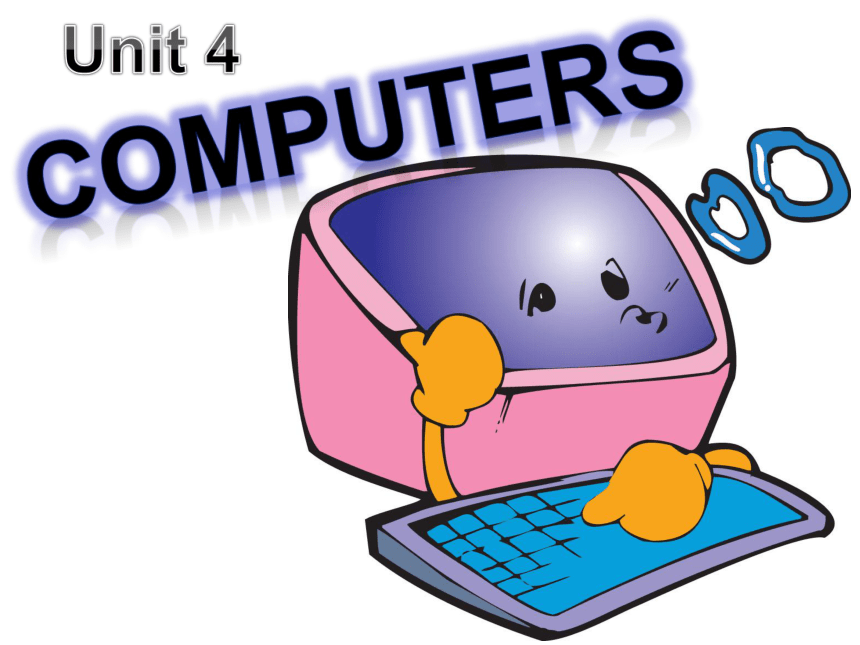
|
|
| 格式 | zip | ||
| 文件大小 | 9.9MB | ||
| 资源类型 | 教案 | ||
| 版本资源 | 牛津上海版(试用本) | ||
| 科目 | 英语 | ||
| 更新时间 | 2017-09-16 00:00:00 | ||
图片预览

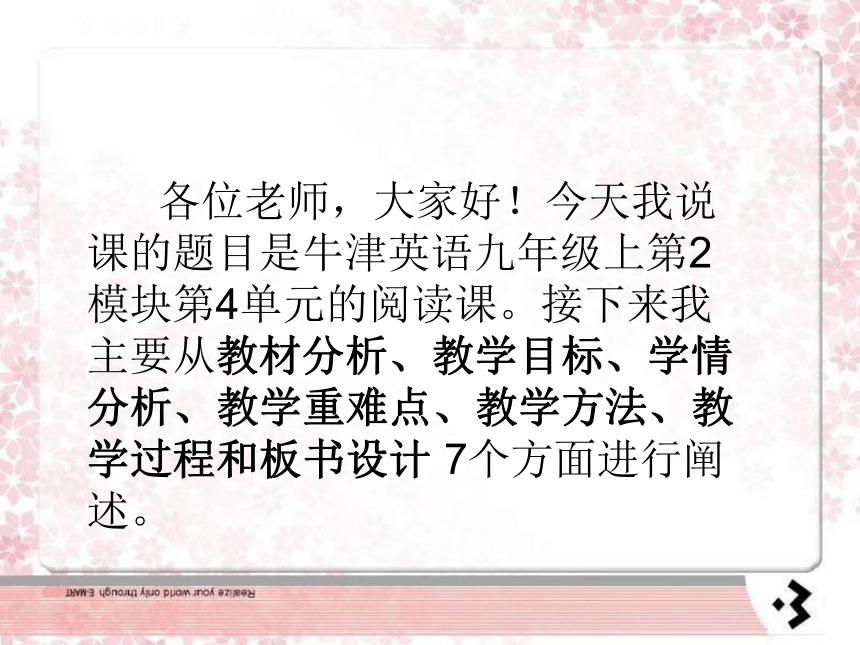

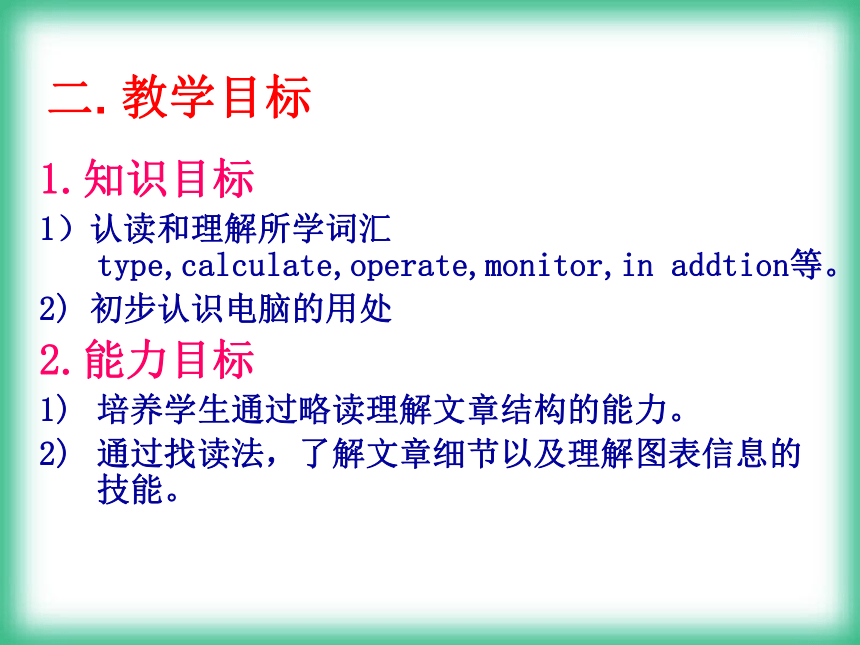
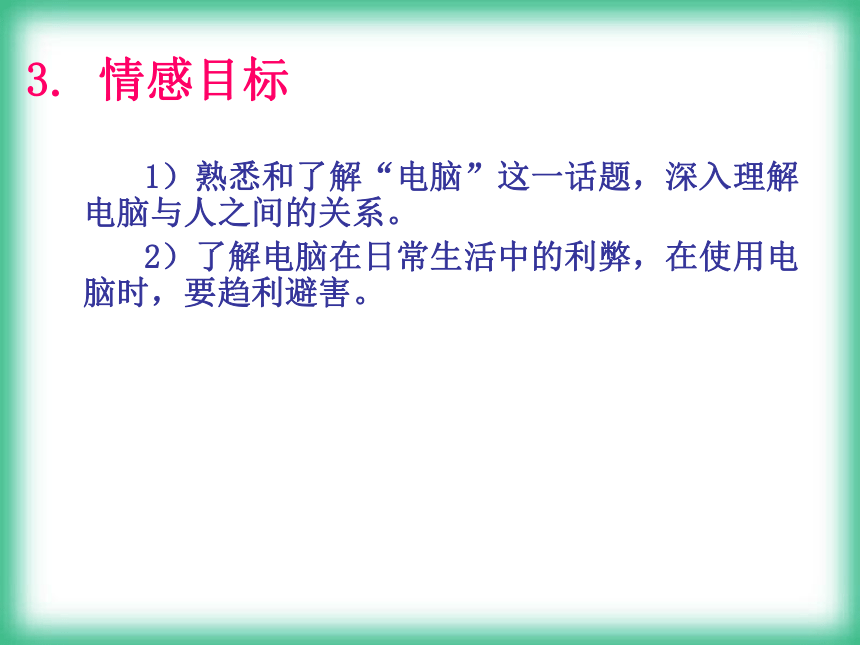


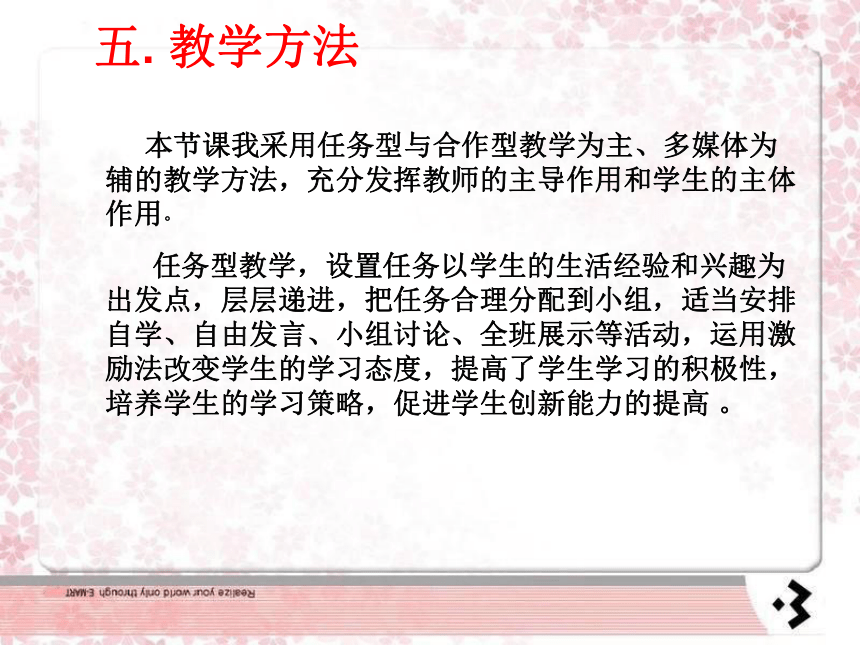
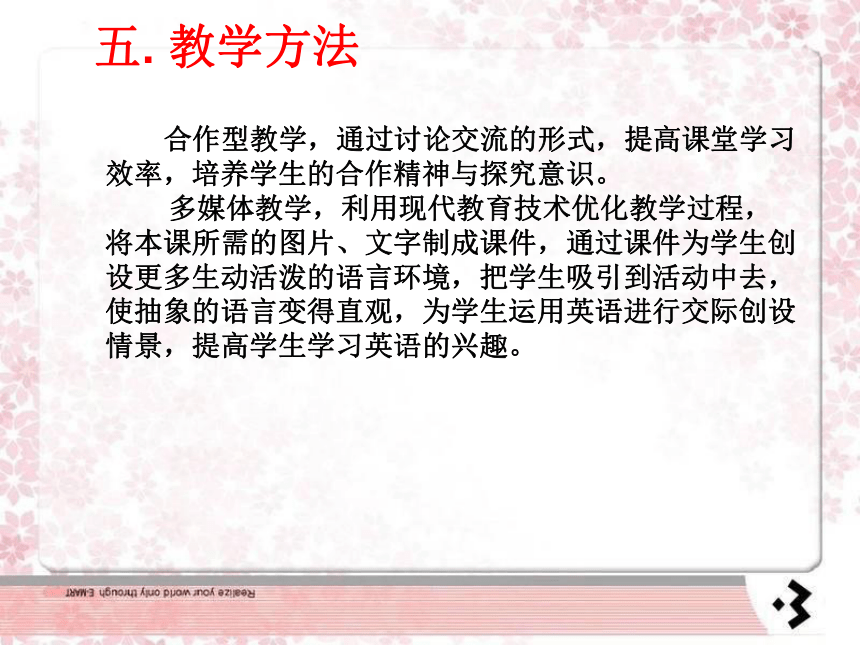


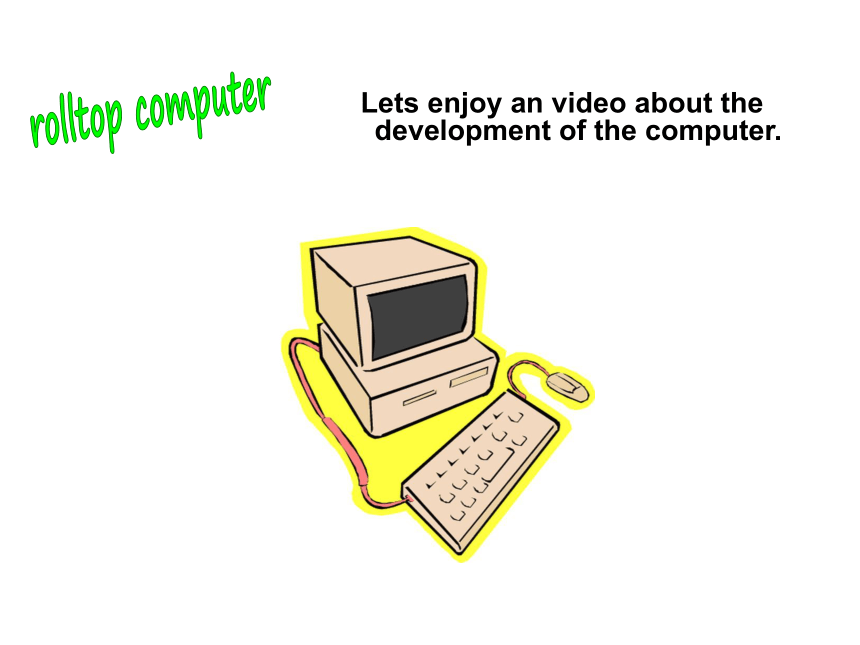
文档简介
课件43张PPT。Computers Unit 4
各位老师,大家好!今天我说课的题目是牛津英语九年级上第2模块第4单元的阅读课。接下来我主要从教材分析、教学目标、学情分析、教学重难点、教学方法、教学过程和板书设计 7个方面进行阐述。 一. 教材分析 本单元的中心话题是“电脑(Computers)”,以电脑和互联网的用途为主线,学生在阅读板块通过阅读一篇介绍电脑的外观、用途和未来发展趋势的说明文,主旨是对电脑与人类的关系发表看法,了解电脑在人类社会中的重要作用。阅读的话题不仅与本单元语法、听力环节联系紧密,而且与学生的学习和生活密切相关,因此我鼓励学生积极开动脑筋,动用自己的知识储备对阅读篇章进行补充,并为其他各环节奠定基础。二. 教学目标1.知识目标
1)认读和理解所学词汇type,calculate,operate,monitor,in addtion等。
2) 初步认识电脑的用处
2.能力目标
培养学生通过略读理解文章结构的能力。
通过找读法,了解文章细节以及理解图表信息的技能。
3. 情感目标
1)熟悉和了解“电脑”这一话题,深入理解电脑与人之间的关系。
2)了解电脑在日常生活中的利弊,在使用电脑时,要趋利避害。
三. 学情分析 本节阅读课的授课对象是初二学生(两级分化比较明显),部分学生对英语语言知识有了一定的积累,具备了一定的阅读理解能力。但大部分学生缺乏系统的做题方法和技巧,学习英语他们感到既好奇又担忧,但内心更希望能得到他人的肯定,因此,给予学生正确的方法技巧和理念指导是非常必要的。因此,在教学活动中为不同层次的学生创造机会,降低学习难度,让他们积极参与到活动中来展现自己,并通过学生间的合作学习,使他们体验到成功的喜悦,提高他们综合运用语言的能力,使各层次的学生都有所收获。四. 教学重难点1.教学重点
1)略读全文并能总结归纳文章的段落大意;
2)跳读文章能准确定位相关信息,掌握文章的结构。
2.教学难点
1)学生在阅读过程中运用图表理清文章的结构和主旨大意;
2)对生词的处理和阅读方法的灵活运用。
五. 教学方法
本节课我采用任务型与合作型教学为主、多媒体为辅的教学方法,充分发挥教师的主导作用和学生的主体作用。
任务型教学,设置任务以学生的生活经验和兴趣为出发点,层层递进,把任务合理分配到小组,适当安排自学、自由发言、小组讨论、全班展示等活动,运用激励法改变学生的学习态度,提高了学生学习的积极性,培养学生的学习策略,促进学生创新能力的提高 。
五. 教学方法
合作型教学,通过讨论交流的形式,提高课堂学习效率,培养学生的合作精神与探究意识。
多媒体教学,利用现代教育技术优化教学过程,将本课所需的图片、文字制成课件,通过课件为学生创设更多生动活泼的语言环境,把学生吸引到活动中去,使抽象的语言变得直观,为学生运用英语进行交际创设情景,提高学生学习英语的兴趣。
六.教学环节Let's go!lead-in
Lets enjoy an video about the development of the computer.rolltop computerWhat do you know about computers?
目的运用“头脑风暴”激活学生们已有的英语知识,提高他们的观察能力和表达能力,进而导入本课。Brain stormshapespartssizescolorsusesdrivesmonitorkeyboardmain unitmousespeakersDo you know them?CD-ROMs
calculate
(给学生提供一些图片信息和所学词汇,让学生运用已有知识,巩固所学词汇,提高用英语表达的能力)
type and printWhat do you usually do with computer in your daily life? draw thing like diagrams and graphs. teach you many things and also play games with you.
(学生通过畅所欲言,能够知道computers are very important in our daily lives.)pre-readingLook at the pictures, the title and the sub-headings of the article on page 35. Then tick (√) the facts that the article probably talks about.(旨在训练学生运用略读策略,注意观察文章的图片、标题和小标题,快速而准确地完成练习) Skimming:Task Ⅰ Computers are getting smaller and better.
2. Computers can do important jobs like flying planes.
3. Computers may work as doctors.
4. computers are clever than people .√√√while-reading
A.The uses of computers in daily
life.
B. The sizes of computers in different times.
C.The relationship(关系)between human beings and computers in the future.
P1-2
P3
P4-5
Task Ⅰ
Read the passage and match the main idea with each part. 通过整体略读小标题快速浏览全文,领略内容大意,抓住主题句,要有意识地培养学生找到文章的主题句,抓住中心论点的能力,使学生理解主题句与文章的具体事实细节的关系,帮助理解为找读做准备。? 找读属于精读的范畴,可以分段细读。为了准确地寻找所需要的细节,并理解细节,抓住主要事实和关键信息所揭示文章结构内在的联系,帮助深化理解。Scanning Task 2 Read the first part of the article and complete the table below.Smaller and betterbigger than carssmaller and betterThere is probably a tiny computer inside your TV or washing machine.You depend on computers more than you realize. 首先,通过图表形式练习,加深学生对文章结构(包括句子、段落和篇章)更深层次的理解,而且理解文章的中心思想又是怎样通过结构表达出来的,一目了然。calculate at a faster speed than we canalmost never give wrong answerstype and draw thingsdo important jobsfly planesoperate railways Read the second part of the article and complete the table below.What can we do with computers?fly spaceshipsTrue or False
Computers are as clever as human beings.
Computers have greater understanding of
the meaning of things.
Computers cannot create new ideas for the
time being.
Computers are better at doing their jobs
than doctors, judges and teachers at present.Is a computer cleverer than me? People in the future第三部分以判断正误的形式出现,学生要善于捕捉
文中细节,利用细节具体分析和深入挖掘文章的主旨,理清电脑与人类的关系。post-reading
1 S1: We can do many things with computers in our daily life.
S2: For example?
S1: We can ________, ____ and __________ with them.Work in groups and make a dialogue according to the passage.
(读后,要求学生根据文章内容补全对话,或自编对话,小组表演,以此来考察学生对文章信息掌握的熟练程度;课后,学生也可根据表格或对话的形式尝试复述课文或部分段落,进一步熟悉课文,提高用英语表达某类话题的能力) calculate type draw thingsStudents’ Show in classroom2 S1: Computers can do some important jobs.
S2: For example?
S1: They can _______________ and ______________________.
3 S1: One day, computers may be able to do a better job than human beings.
S2: For example?
S1: They ___________________________
_____________. operate railways
fly planes and spaceships may be better than doctors at doing their job4. S1: Are computers cleverer than you an me?
Why or why not?
S2:No, they aren’t. Because our brains can produce new ideas but computers cannot.
Homework
Discuss and answer the question below with your classmates.(课后作业,从日常生活中学生熟知的话题入手,了解电脑的利与弊,从而更好地趋利避害,使电脑更好地为人类服务。)HomeworkIn your opinion:
Do you depend on computers a lot in your daily life? Give examples.
What should students do or not do with computers?
Do you agree that computers will be able to do all our jobs in the future? Give reasons.
computers Talk about the advantages and
disadvantages of the
Computers:
In my opinion,I can
use the computer
to….
DiscussionWe can use the computer to…….
listen to musicWatch moviessearch for …communicate with…do shopping遵循从词汇、短语-——连词句子——篇章的步骤,降低难度,让学生能有话可说,有话可写,达到情感的升华(We do a lot of things with computers, but we should use it in a good way.)
。?1.Waste too much time
2.It is bad for our health and eyes.
3. May be cheated(被欺骗 by strangers
4. Have no time to study…
5.Be addicted to(沉溺于) the computer games
We can( not ) use the computers to…巩固型作业:运用本节课所学的阅读策略,完成报纸两篇类似阅读任务。
2.拓展型作业:the advantages and disadvantages of computers(运用不同的形式,eg.:海报、作文、手抄报话剧等,用英语谈一谈电脑的利与弊)Black-board design(板书设计)网状结构图首先能使学生快速熟悉话题,并在不断参加活动中,完成任务,接触和巩固重点单词、短语、句型;其次,基于文章结构,便于学生在课堂中随时进行思路检索,便于在课程结束时进行复习和及使反思,将语篇内化。Computers
factssizesusesfuture Becoming
____ and
___caculatetype and drawOperate_____
and fly _____课后反思: 本节课是一堂英语阅读课。本着“师生互动、共同学习”的原则,在层层递进的教学过程中,注重培养学生的综合应用能力。然而,阅读是一个过程,能力的提高更是一个循序渐进的过程。而阅读技巧是灵活多变的,阅读课仅限于课堂是远远不够的,其能力的提高也远非一日之功。在授课过程中,基础薄弱的学生可能会有一些障碍,不能按要求完成布置的任务,或需要在老师或小组的辅导下完成指定任务,但是进步永无止境。
在以后的教学中,我将不断调节授课策略,针对不同层次学生的学习特点,不断改进教学方法,让不同层面的学生都有一个自我展示、自我提高的机会。Goodbye!
各位老师,大家好!今天我说课的题目是牛津英语九年级上第2模块第4单元的阅读课。接下来我主要从教材分析、教学目标、学情分析、教学重难点、教学方法、教学过程和板书设计 7个方面进行阐述。 一. 教材分析 本单元的中心话题是“电脑(Computers)”,以电脑和互联网的用途为主线,学生在阅读板块通过阅读一篇介绍电脑的外观、用途和未来发展趋势的说明文,主旨是对电脑与人类的关系发表看法,了解电脑在人类社会中的重要作用。阅读的话题不仅与本单元语法、听力环节联系紧密,而且与学生的学习和生活密切相关,因此我鼓励学生积极开动脑筋,动用自己的知识储备对阅读篇章进行补充,并为其他各环节奠定基础。二. 教学目标1.知识目标
1)认读和理解所学词汇type,calculate,operate,monitor,in addtion等。
2) 初步认识电脑的用处
2.能力目标
培养学生通过略读理解文章结构的能力。
通过找读法,了解文章细节以及理解图表信息的技能。
3. 情感目标
1)熟悉和了解“电脑”这一话题,深入理解电脑与人之间的关系。
2)了解电脑在日常生活中的利弊,在使用电脑时,要趋利避害。
三. 学情分析 本节阅读课的授课对象是初二学生(两级分化比较明显),部分学生对英语语言知识有了一定的积累,具备了一定的阅读理解能力。但大部分学生缺乏系统的做题方法和技巧,学习英语他们感到既好奇又担忧,但内心更希望能得到他人的肯定,因此,给予学生正确的方法技巧和理念指导是非常必要的。因此,在教学活动中为不同层次的学生创造机会,降低学习难度,让他们积极参与到活动中来展现自己,并通过学生间的合作学习,使他们体验到成功的喜悦,提高他们综合运用语言的能力,使各层次的学生都有所收获。四. 教学重难点1.教学重点
1)略读全文并能总结归纳文章的段落大意;
2)跳读文章能准确定位相关信息,掌握文章的结构。
2.教学难点
1)学生在阅读过程中运用图表理清文章的结构和主旨大意;
2)对生词的处理和阅读方法的灵活运用。
五. 教学方法
本节课我采用任务型与合作型教学为主、多媒体为辅的教学方法,充分发挥教师的主导作用和学生的主体作用。
任务型教学,设置任务以学生的生活经验和兴趣为出发点,层层递进,把任务合理分配到小组,适当安排自学、自由发言、小组讨论、全班展示等活动,运用激励法改变学生的学习态度,提高了学生学习的积极性,培养学生的学习策略,促进学生创新能力的提高 。
五. 教学方法
合作型教学,通过讨论交流的形式,提高课堂学习效率,培养学生的合作精神与探究意识。
多媒体教学,利用现代教育技术优化教学过程,将本课所需的图片、文字制成课件,通过课件为学生创设更多生动活泼的语言环境,把学生吸引到活动中去,使抽象的语言变得直观,为学生运用英语进行交际创设情景,提高学生学习英语的兴趣。
六.教学环节Let's go!lead-in
Lets enjoy an video about the development of the computer.rolltop computerWhat do you know about computers?
目的运用“头脑风暴”激活学生们已有的英语知识,提高他们的观察能力和表达能力,进而导入本课。Brain stormshapespartssizescolorsusesdrivesmonitorkeyboardmain unitmousespeakersDo you know them?CD-ROMs
calculate
(给学生提供一些图片信息和所学词汇,让学生运用已有知识,巩固所学词汇,提高用英语表达的能力)
type and printWhat do you usually do with computer in your daily life? draw thing like diagrams and graphs. teach you many things and also play games with you.
(学生通过畅所欲言,能够知道computers are very important in our daily lives.)pre-readingLook at the pictures, the title and the sub-headings of the article on page 35. Then tick (√) the facts that the article probably talks about.(旨在训练学生运用略读策略,注意观察文章的图片、标题和小标题,快速而准确地完成练习) Skimming:Task Ⅰ Computers are getting smaller and better.
2. Computers can do important jobs like flying planes.
3. Computers may work as doctors.
4. computers are clever than people .√√√while-reading
A.The uses of computers in daily
life.
B. The sizes of computers in different times.
C.The relationship(关系)between human beings and computers in the future.
P1-2
P3
P4-5
Task Ⅰ
Read the passage and match the main idea with each part. 通过整体略读小标题快速浏览全文,领略内容大意,抓住主题句,要有意识地培养学生找到文章的主题句,抓住中心论点的能力,使学生理解主题句与文章的具体事实细节的关系,帮助理解为找读做准备。? 找读属于精读的范畴,可以分段细读。为了准确地寻找所需要的细节,并理解细节,抓住主要事实和关键信息所揭示文章结构内在的联系,帮助深化理解。Scanning Task 2 Read the first part of the article and complete the table below.Smaller and betterbigger than carssmaller and betterThere is probably a tiny computer inside your TV or washing machine.You depend on computers more than you realize. 首先,通过图表形式练习,加深学生对文章结构(包括句子、段落和篇章)更深层次的理解,而且理解文章的中心思想又是怎样通过结构表达出来的,一目了然。calculate at a faster speed than we canalmost never give wrong answerstype and draw thingsdo important jobsfly planesoperate railways Read the second part of the article and complete the table below.What can we do with computers?fly spaceshipsTrue or False
Computers are as clever as human beings.
Computers have greater understanding of
the meaning of things.
Computers cannot create new ideas for the
time being.
Computers are better at doing their jobs
than doctors, judges and teachers at present.Is a computer cleverer than me? People in the future第三部分以判断正误的形式出现,学生要善于捕捉
文中细节,利用细节具体分析和深入挖掘文章的主旨,理清电脑与人类的关系。post-reading
1 S1: We can do many things with computers in our daily life.
S2: For example?
S1: We can ________, ____ and __________ with them.Work in groups and make a dialogue according to the passage.
(读后,要求学生根据文章内容补全对话,或自编对话,小组表演,以此来考察学生对文章信息掌握的熟练程度;课后,学生也可根据表格或对话的形式尝试复述课文或部分段落,进一步熟悉课文,提高用英语表达某类话题的能力) calculate type draw thingsStudents’ Show in classroom2 S1: Computers can do some important jobs.
S2: For example?
S1: They can _______________ and ______________________.
3 S1: One day, computers may be able to do a better job than human beings.
S2: For example?
S1: They ___________________________
_____________. operate railways
fly planes and spaceships may be better than doctors at doing their job4. S1: Are computers cleverer than you an me?
Why or why not?
S2:No, they aren’t. Because our brains can produce new ideas but computers cannot.
Homework
Discuss and answer the question below with your classmates.(课后作业,从日常生活中学生熟知的话题入手,了解电脑的利与弊,从而更好地趋利避害,使电脑更好地为人类服务。)HomeworkIn your opinion:
Do you depend on computers a lot in your daily life? Give examples.
What should students do or not do with computers?
Do you agree that computers will be able to do all our jobs in the future? Give reasons.
computers Talk about the advantages and
disadvantages of the
Computers:
In my opinion,I can
use the computer
to….
DiscussionWe can use the computer to…….
listen to musicWatch moviessearch for …communicate with…do shopping遵循从词汇、短语-——连词句子——篇章的步骤,降低难度,让学生能有话可说,有话可写,达到情感的升华(We do a lot of things with computers, but we should use it in a good way.)
。?1.Waste too much time
2.It is bad for our health and eyes.
3. May be cheated(被欺骗 by strangers
4. Have no time to study…
5.Be addicted to(沉溺于) the computer games
We can( not ) use the computers to…巩固型作业:运用本节课所学的阅读策略,完成报纸两篇类似阅读任务。
2.拓展型作业:the advantages and disadvantages of computers(运用不同的形式,eg.:海报、作文、手抄报话剧等,用英语谈一谈电脑的利与弊)Black-board design(板书设计)网状结构图首先能使学生快速熟悉话题,并在不断参加活动中,完成任务,接触和巩固重点单词、短语、句型;其次,基于文章结构,便于学生在课堂中随时进行思路检索,便于在课程结束时进行复习和及使反思,将语篇内化。Computers
factssizesusesfuture Becoming
____ and
___caculatetype and drawOperate_____
and fly _____课后反思: 本节课是一堂英语阅读课。本着“师生互动、共同学习”的原则,在层层递进的教学过程中,注重培养学生的综合应用能力。然而,阅读是一个过程,能力的提高更是一个循序渐进的过程。而阅读技巧是灵活多变的,阅读课仅限于课堂是远远不够的,其能力的提高也远非一日之功。在授课过程中,基础薄弱的学生可能会有一些障碍,不能按要求完成布置的任务,或需要在老师或小组的辅导下完成指定任务,但是进步永无止境。
在以后的教学中,我将不断调节授课策略,针对不同层次学生的学习特点,不断改进教学方法,让不同层面的学生都有一个自我展示、自我提高的机会。Goodbye!
